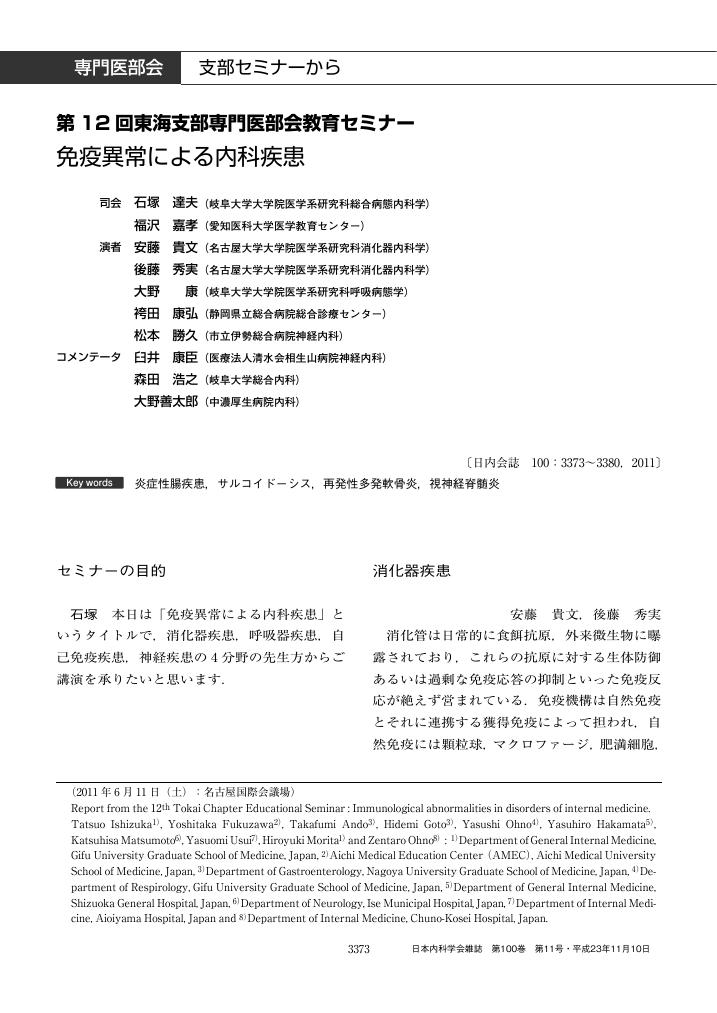2 0 0 0 3.11とメディアスポーツ
- 著者
- 森田 浩之
- 出版者
- 日本スポーツ社会学会
- 雑誌
- スポーツ社会学研究
- 巻号頁・発行日
- vol.20, no.1, pp.37-48, 2012
本稿は、東日本大震災後にメディアに表れたスポーツにからむ「物語(ナラティブ)」を検証し、その功罪を検討する。<br> 「未曾有の国難」に沈む日本と被災地を、スポーツとトップアスリートが元気づける──そうした動きと思想は、まずヨーロッパでプレイするサッカー選手3人が出演するACジャパンの公共CMにみられた。「日本の強さは団結力です」「日本がひとつのチームなんです」という選手たちのせりふは何げないものに聞こえるが、そこには日本のメディアスポーツが語りつづけてきた物語が詰まっていた。<br> メディアが大震災と最も強く結びつけた大ニュースが、「なでしこジャパン」の愛称で知られるサッカー日本女子代表のワールドカップ優勝だった。ひとつは国家的悲劇であり、もうひとつは国民的慶事と、対照的にみえるふたつの出来事が、メディアによって強く接合された。なでしこジャパンは被災地から「元気」をもらったとされ、なでしこが世界一になったことで被災地も「元気」をもらったとされた。それらの物語はどのメディアをとっても均質的、類型的であり、東北出身の選手や東京電力に勤務したことのある選手には特別な役回りを担わせていた。しかもメディアが意図したかどうかにかかわらず、「あきらめない心」や「粘り強さ」といったなでしこジャパンの特徴とされるものは、3.11後の「日本人」に求められる心性と重なっていた。<br> このような均一化された物語の過剰は、「絆」ということばが3.11後のキーワードになることに加担した。被災地との「絆」がつねにあるかのように語られることで、現実には存在する非・被災地との分断が覆い隠されるおそれもある。
2 0 0 0 OA 3.11とメディアスポーツ ―物語の過剰をめぐって―
- 著者
- 森田 浩之
- 出版者
- 日本スポーツ社会学会
- 雑誌
- スポーツ社会学研究 (ISSN:09192751)
- 巻号頁・発行日
- vol.20, no.1, pp.37-48, 2012-03-25 (Released:2016-09-06)
- 参考文献数
- 14
本稿は、東日本大震災後にメディアに表れたスポーツにからむ「物語(ナラティブ)」を検証し、その功罪を検討する。 「未曾有の国難」に沈む日本と被災地を、スポーツとトップアスリートが元気づける──そうした動きと思想は、まずヨーロッパでプレイするサッカー選手3人が出演するACジャパンの公共CMにみられた。「日本の強さは団結力です」「日本がひとつのチームなんです」という選手たちのせりふは何げないものに聞こえるが、そこには日本のメディアスポーツが語りつづけてきた物語が詰まっていた。 メディアが大震災と最も強く結びつけた大ニュースが、「なでしこジャパン」の愛称で知られるサッカー日本女子代表のワールドカップ優勝だった。ひとつは国家的悲劇であり、もうひとつは国民的慶事と、対照的にみえるふたつの出来事が、メディアによって強く接合された。なでしこジャパンは被災地から「元気」をもらったとされ、なでしこが世界一になったことで被災地も「元気」をもらったとされた。それらの物語はどのメディアをとっても均質的、類型的であり、東北出身の選手や東京電力に勤務したことのある選手には特別な役回りを担わせていた。しかもメディアが意図したかどうかにかかわらず、「あきらめない心」や「粘り強さ」といったなでしこジャパンの特徴とされるものは、3.11後の「日本人」に求められる心性と重なっていた。 このような均一化された物語の過剰は、「絆」ということばが3.11後のキーワードになることに加担した。被災地との「絆」がつねにあるかのように語られることで、現実には存在する非・被災地との分断が覆い隠されるおそれもある。
1 0 0 0 OA 各種下垂体機能低下症における抗下垂体抗体の検索と, その遺伝的背景についての検討
- 著者
- 森 昭裕 梶田 和男 山北 宜由 森田 浩之 村井 敏博 安田 圭吾 杉浦 正彦 三浦 清
- 出版者
- 一般社団法人 日本内分泌学会
- 雑誌
- 日本内分泌学会雑誌 (ISSN:00290661)
- 巻号頁・発行日
- vol.67, no.10, pp.1147-1161, 1991-10-20 (Released:2012-09-24)
- 参考文献数
- 23
- 被引用文献数
- 1 1
Recently several types of anti-pituitary-antibodies (APA) have been found in patients with pituitary disorders including hypopituitarism and diabetes incipidus, and in postpartum women. However, the pathophysiological role(s) of APA still remains unknown. In order to elucidate the clinical significance of APA, longitudinal follow-up and family study of APA in patients with hypopituitarism were performed.APA in serum was examined in a total of 11 patients with various types of hypopituitarism (7 of isolated ACTH deficiency, 1 of partial hypopituitarism, 3 of Sheehan's syndrome, 6 males and 5 females). Chronic thyroiditis was associated in 3 out of 7 patients with isolated ACTH deficiency, and empty sella was found in each one patient with isolated ACTH deficiency and partial hypopituitarism, and in 3 patients with Sheehan's syndrome. APA was examined on 2 or 3 occasions at more than a 6 month interval (longitudinal study). In 5 patients, their 16 family members were examined for the presence of APA, and pituitary functions were evaluated in 3 out of 7 family members with positive APA (family study). For pituitary function tests, arginine infusion test, TRH, LH-RH or CRH test and insulin tolerance test were performed. APA reacting to rat pituitary cytoplasmic antigens (pituitary cell antibodies: PCA) and APA reacting to rat GH3 cells and/or mouse AtT20 cells surface antigens (pituitary cell surface antibodies: PCSA) were assayed with indirect immunofluorescence method.At the initial examination, 6 out of 11 patients (55%) showed positive APA. Thepatients were divided into 3 subgroups according to the longitudinal study: the group with disappearance of initially positive APA (3 patients), the group with altered titers or types of initially positive APA (3 patients), and the group with sustained initially negative APA (4 patients). No effects of replacement therapy on the alterations of APA were observed.In 16 family members of 5 patients (each 1 with partial hypopituitarism and isolated ACTH deficiency syndrome, and 3 with Sheehan's syndrome), APA in their sera were investigated. Seven out of 16 members (44%) showed positive APA. Among 6 first-degree relatives of 16 family members, both or either one of APA and PCSA were positive in 4 (67%). Out of 10 of their second- or third-degree relatives, 3 (30%) were positive for PCA or PCSA. All of 3 relatives with positive APA studied showed mild pituitary hypofunction without any clinical manifestations.These results suggest the possibility that autoimmune mechanism-induced hypofunction as well as hereditary background might participate in the pathogenesis of some hypopituitarism, and that APA might have a causative role in such disorders.
